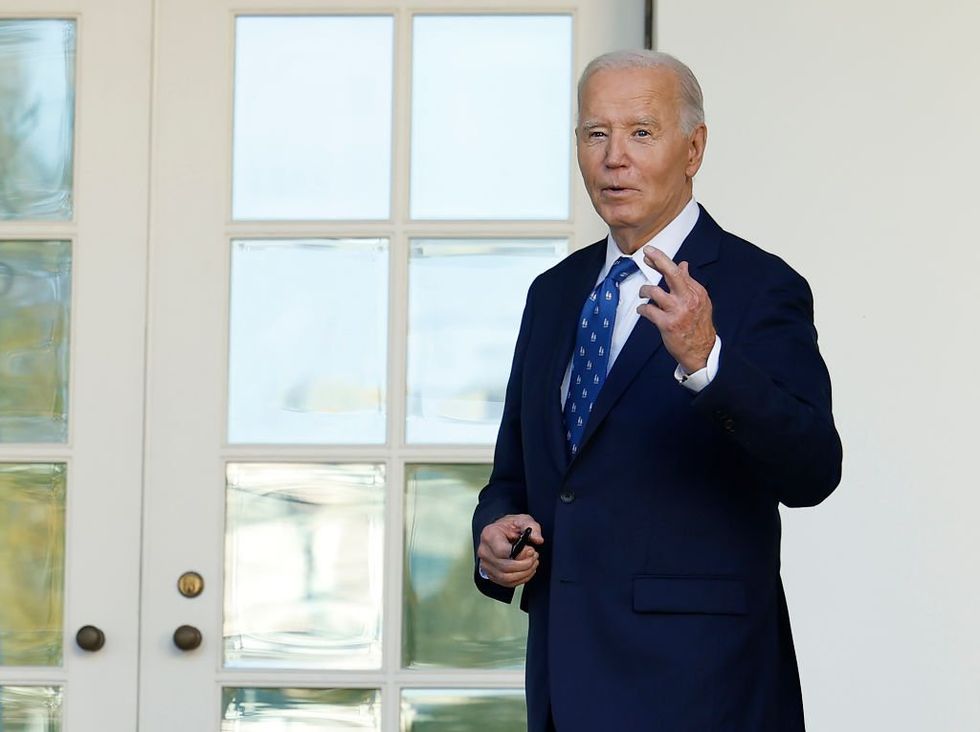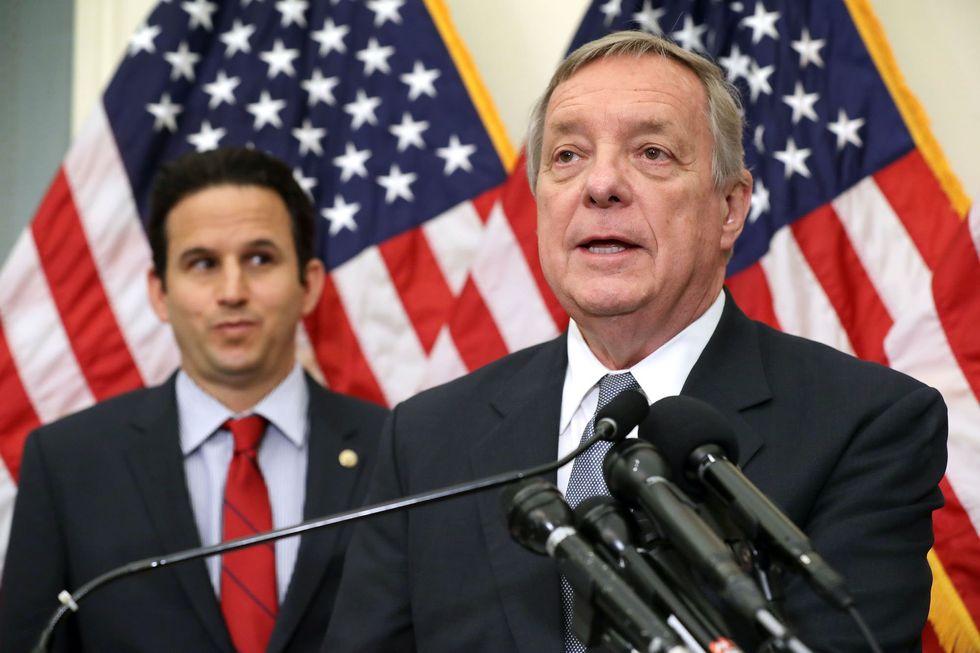WATCH: China issues serious warning to Trump over Taiwan
Trade war on the horizon as president-elect takes tough stance on international commerce



After President-elect Donald Trump’s monumental win in the 2024 presidential election, a trade war between the world’s two largest economies is about to reignite, with diplomacy already deteriorating over China’s warning to Trump over U.S.-Taiwan relations.
Spokesperson for the Chinese Embassy in the U.S. Liu Pengyu told Newsweek the question over Taiwan’s ownership is the biggest point of contention between the U.S. and China, noting Trump should “abide by the One China principle.”
“The U.S. government needs to earnestly abide by the One China principle and the three China-U.S. joint communiques and prudently handle Taiwan-related issues so as to avoid severe damage to China-U.S. relations and cross-Strait peace and stability.”
Various reports have noted Taiwan could potentially enter into a new $15 billion arms deal with the U.S. which includes the purchase of F-35 fighter jets, retired navy warships, and Advanced Hawkeyes.
The potential deal would add to already existing agreements made to purchase missile systems from the U.S. in early October worth $2 billion, and another $20 billion in weapons Taiwan purchased in 2023, which Taiwan has complained has not yet been fulfilled.
Unsurprisingly, the arms deals between Taiwan and the U.S. raised the ire of China, who strictly maintains “Taiwan is an inalienable part of China’s territory” through its One China principle, and cites international recognition of the principle as its legitimizer.
China’s Ministry of Foreign Affairs spokesperson Lin Jian said in late October his nation firmly opposed any military contact between the U.S. and Taiwan after Taiwan announced it was purchasing 1,000 attack drones from defense contractor AeroVironment and defense tech firm Anduril Industries – both American companies.
“Taiwan is a province of China. There is no so-called ‘defense ministry’ in the province. China is firmly opposed to any U.S. military contact with Taiwan. This position is consistent and unequivocal,” Lin said, adding the American companies had been sanctioned.
Spokesperson for China’s Ministry of National Defense Zhang Xiaogang said the U.S. had gone back on its promises to stop arming Taiwan.
“The United States has reneged on its own promise and is intensifying efforts to arm Taiwan, emboldening the ‘Taiwan independence’ separatist forces, and pushing Taiwan closer towards the abyss of a military conflict,” Zhang said.
The spokesperson then accused the U.S. of exploiting Taiwan, stating it was taking money to feed the military-industrial complex, and further blamed growing tension on Taiwan “separatists.”
“Records have proven time and time again that the ‘Taiwan independence’ separatists and foreign interference are the source of chaos that undermine the status quo, cause cross-strait issues, and disrupt regional stability,” Zhang said.
Established in the 1970s, the “One China” policy is the U.S.’ way to acknowledge there is only one China, including Taiwan – which is officially called the Republic of China – but doesn’t directly endorse China’s sovereignty over Taiwan, according to Newsweek. Because of this, the U.S. is able to maintain an unofficial relationship with Taiwan.
During Trump’s first term in office, his administration imposed high tariffs on Chinese goods imported into the U.S. in 2018. The move caused a blow to China’s economy, however, relations further soured in 2020 when China’s Wuhan Institute of Virology leaked COVID-19 from its labs, killing millions and disrupting the world’s supply chains.
Trump has since promised during his campaign to slap at least 60% tariffs on all Chinese exports once he is back in the White House, but the Chinese Embassy has advised Trump against increasing tariffs, saying it will hurt both economies.
“There is no winner in a trade war, nor will the world benefit from it. Further increasing tariffs on Chinese products will only significantly drive up the cost of imported goods, inflict more loss on American companies and consumers, and will eventually backfire,” the Chinese Embassy told Newsweek.
China has recently been trying to energize its economy with a series of stimulus packages after its property and infrastructure markets collapsed. Analysts have warned the $1.4 billion recently approved will do little to stimulate consumption, and is nothing more than a “debt-swap” program.
Part of the reason for China’s lagging economy was the strict zero-COVID policies enforced on Chinese citizens during the pandemic, with the government keeping the restrictions in place longer than any other country, only removing them in December 2022, after protests swept the nation, according to the BBC.
The extended lockdowns cooled China’s growth, while China’s strengthening trade partnership with Russian President Vladimir Putin, as well as its rising prominence within BRICS, and the advantage it gained thanks to the Biden-Harris administration’s weaknesses improved China’s economy temporarily, but it is still in a very vulnerable situation.
The increasing pressure on China is likely to be further exacerbated by incoming American patriots to Trump’s new administration, with appointees harshly criticizing China in the past, and being given top positions in the U.S.’s defense against China.
Dubbed a “China Hawk” by mainstream media, Sen. Marco Rubio, R-Fla., will be appointed U.S. Secretary of State, and is the first person to hold that position while simultaneously being sanctioned by China, according to Bloomberg.
In a 58-page Senate report authored by Rubio titled The World China Made: ‘Made In China 2025’ Nine Years Later, it details China’s meteoric rise as a global superpower, and how it used the U.S. to get into that position.
In the report’s foreword, Rubio states Communist China is “the most powerful adversary the United states has faced in living memory.” Rubio notes China poses a far greater threat than Nazi Germany or Soviet Russia, simply because China is able to better compete against the U.S. economically, and also militarily.
“It [China] controls the largest industrial base in the world, fuels its factories with market-distorting subsidies and rampant theft,” Rubio said, adding, “Beijing will have greater sway over which set of values defines the 21st century: liberty and representative government, or authoritarianism and oppression.”
During an interview with World Over, Rubio questioned why no one holds China responsible for the blatant disregard for the U.S. when it comes to stealing intellectual property, but noted Trump will hold them accountable.
“Why do Chinese companies get to do whatever they want in our economy, but our companies do not? So all Donald Trump is saying is we’re going to get along but we’re gonna get along in an even playing field, not one in which China continues to be allowed to cheat and steal, and get away with things that are bad for America,” Rubio said.
“It’s time to level the playing field with China. No more cheating. No more stealing. No more free passes.”
Senator Marco Rubio,
Secretary of the State, United States of America.
It’s time we tightened the noose on Chinese malpractices. @SenMarcoRubio pic.twitter.com/NMLzljH5cp
— William Turner (@WilliamTur21) November 12, 2024
What's Your Reaction?

































































































